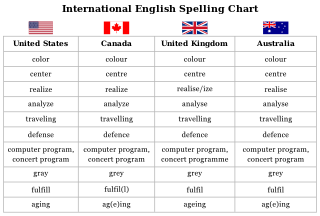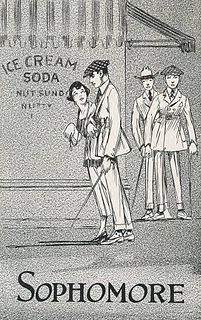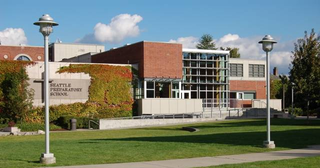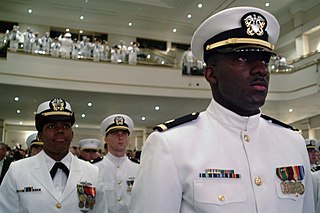
The English language was introduced to the Americas by British colonisation, beginning in the late 16th and early 17th centuries. The language also spread to numerous other parts of the world as a result of British trade and colonisation and the spread of the former British Empire, which, by 1921, included 470–570 million people, about a quarter of the world's population. Written forms of British and American English as found in newspapers and textbooks vary little in their essential features, with only occasional noticeable differences.

A student is primarily a person enrolled in a school or other educational institution.
A junior college is a post-secondary educational institution offering vocational training designed to prepare students for either skilled trades and technical occupations and workers in support roles in professions such as engineering, accountancy, business administration, nursing, medicine, architecture, and criminology, or for additional education at another college with more advanced academic material. Students typically attend junior colleges for one to three years.

In the United States, a sophomore is a student in the second year of study at high school or college. In sports, sophomore may also refer to a professional athlete in their second season.
Valedictorian is an academic title of success used in the United States, Canada, Kuwait, Egypt, Philippines for the student who delivers the closing or farewell statement at a graduation ceremony. The chosen valedictorian is traditionally the student with the highest academic standing among their graduating class, and that standing is commonly determined by a numerical formula for Grade Point Average (GPA), but other methods of selection are also in use. The term is an Anglicised derivation of the Latin vale dicere, historically rooted in the valedictorian's traditional role as the final speaker at the graduation ceremony before the students receive their diplomas. The valedictory address generally is considered a final farewell to classmates, before they disperse to pursue their individual paths after graduating.

Seattle Preparatory School, popularly known as Seattle Prep, is a private, Jesuit high school located on Capitol Hill in Seattle, Washington.
Proctor is a person who takes charge of, or acts for, another.
Tenth grade or grade 10 is the tenth year of school post-kindergarten or the tenth year after the first introductory year upon entering compulsory schooling. In many parts of the world, the students are 15 or 16 years of age, depending on when their birthday occurs. The variants of 10th grade in various countries are described below.
Eleventh grade, 11th grade, junior year, or grade 11 is the eleventh, and for some countries final, grade of secondary schools. Students are typically 16–17 years of age, depending on the country and the students' birthdays.
Twelfth grade, 12th grade, senior year, or grade 12 is the final year of secondary school in most of North America. In other regions, it may also be referred to as class 12 or Year 13. In most countries, students are usually between the ages of 17 and 18 years old. Some countries have a thirteenth grade, while other countries do not have a 12th grade/year at all. Twelfth grade is typically the last year of high school.

The educational system in Taiwan is the responsibility of the Ministry of Education. The system produces pupils with some of the highest test scores in the world, especially in mathematics and science. Former president Ma Ying-jeou announced in January 2011 that the government would begin the phased implementation of a twelve-year compulsory education program by 2014.

The Naval Reserve Officers Training Corps (NROTC) program is a college-based, commissioned officer training program of the United States Navy and the United States Marine Corps.
The Society of Yeager Scholars is the name of the highest academic scholarship offered at Marshall University, named in honor of Chuck Yeager, the first recorded pilot to break the sound barrier.
Pre-medical is an educational track that undergraduate students in the United States pursue prior to becoming medical students. It involves activities that prepare a student for medical school, such as pre-med coursework, volunteer activities, clinical experience, research, and the application process. Some pre-med programs providing broad preparation are referred to as “pre-professional” and may simultaneously prepare students for entry into a variety of first professional degree or graduate school programs that require similar prerequisites.
In higher education a course is a unit of teaching that typically lasts one academic term, is led by one or more instructors, and has a fixed roster of students. A course usually covers an individual subject. Courses generally have a fixed program of sessions every week during the term, called lessons or classes. Students may receive a grade and academic credit after completion of the course. Courses can either be compulsory material or "elective". An elective is usually not a required course, but there are a certain number of non-specific electives that are required for certain majors. The entire collection of courses required to complete an academic degree is called a program of studies.
Redshirt, in United States college athletics, is a delay or suspension of an athlete's participation in order to lengthen their period of eligibility. Typically, a student's athletic eligibility in a given sport is four seasons, aligning with the four years of academic classes typically required to earn a bachelor's degree at an American college or university. However, in a redshirt year, student athletes may attend classes at the college or university, practice with an athletic team, and "suit up" for play – but they may compete in only a limited number of games. Using this mechanism, a student athlete has at most five academic years to use the four years of eligibility, thus becoming what is termed a fifth-year senior.
Biotechnology High School (BTHS), or commonly referred to as Biotech, is a four-year comprehensive vocational public high school serving students in ninth through twelfth grades in Freehold Township, Monmouth County, United States, as part of the Monmouth County Vocational School District (MCVSD). Its curriculum includes a science program, consisting of eight different science classes spread over four years, designed to prepare students to pursue further education in biotechnology and the natural sciences. Emphasis is placed on research, laboratory skills, critical thinking, problem solving, technology, and teamwork. Over 90% of the 2009 graduates selected college majors in the life sciences. The school has been accredited by the Middle States Association of Colleges and Schools Commission on Elementary and Secondary Schools since 2005.

A freshman, first year, or frosh, is a person in the first year at an educational institution, usually a secondary or post-secondary school.
A super senior is a student in a four-year educational institution, such as a high school or undergraduate school, that has over 4 years in attendance or has a surplus of credits required for a diploma and has not yet graduated.

The term senior, in regard to education, has different meanings depending on the country.








